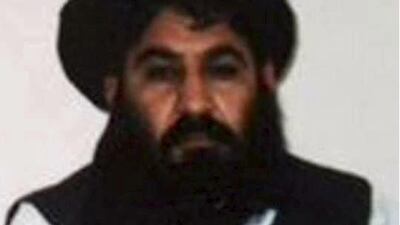KABUL // Afghan Taliban leader Mullah Akhtar Mansour has been killed in a US drone strike, a senior commander from the extremist group confirmed on Sunday.
Mullah Abdul Rauf told Associated Press that Mansour died in the strike late on Friday “in the Afghanistan-Pakistan border area.” Afghanistan’s intelligence agency also confirmed Mansour had been killed.
Afghan Chief Executive Abdullah Abdullah said Mansour’s death would have a positive impact on attempts to bring peace to Afghanistan, where the Taliban have been waging an insurgency for 15 years.
Mansour was “the main figure preventing the Taliban joining the peace process,” Mr Abdullah said as he chaired a Cabinet meeting. “From the day he took over the Taliban following the death of Mullah Omar, he intensified violence against ordinary citizens, especially in Afghanistan.”
US Secretary of State John Kerry said Mansour “posed a continuing imminent threat to US personnel in Afghanistan, Afghan civilians, Afghan security forces” and members of the US/Nato coalition.
He said the air strike on Mansour “sends a clear message to the world that we will continue to stand with our Afghan partners.”
“Peace is what we want, Mansour was a threat to that effort,” Mr Kerry said. “He also was directly opposed to peace negotiations and to the reconciliation process. It is time for Afghans to stop fighting and to start building a real future together.”
Mansour led the Taliban after the death was announced last summer of Mullah Mohammad Omar, the movement’s founder.
But Mansour, Mullah Omar’s deputy, concealed Mullah Omar’s death for more than two years, and also ran the Taliban in his name until the death was revealed by the Afghan government.
The revelation caused wide fissures in the movement that Mansour worked hard to mend.
Mullah Rauf, who confirmed his death on Sunday, was an early detractor of Mansour’s but decided earlier this year to declare loyalty to him in the interest of unifying the movement.
Earlier, the US Department of Defense said a drone strike had targeted Mansour “in a remote area of the Afghanistan-Pakistan border region.”
Afghan officials said the drone strike took place in Pakistan’s Baluchistan province, near the village of Ahmad Wal.
The Afghan government has long accused the Pakistani authorities of harbouring and supporting the Afghan Taliban.
The drone strike targeted Mansour’s vehicle which was carrying Mansour and one other person at the time, a US military source said.
Another Taliban source identified the driver as Muhammad Azam Hasanai, and said the vehicle the two men were travelling in was completely destroyed.
After taking office in 2014, Afghan President Ashraf Ghani prioritised appeasing the Pakistani authorities in the hope that they would encourage the Taliban to participate in a dialogue aimed at ending the war.
Overtures to Islamabad failed, however, and earlier this year Mansour’s Taliban said they rejected peace talks and would not participate.
A four-country process with Afghanistan, Pakistan, China and the United States appears to have floundered, with Kabul refusing to send a delegation to the most recent round of talks, sending only the ambassador to Islamabad.
A senior Afghan official said Mansour controlled a substantial financial empire, largely built on smuggling drugs produced in southern Afghanistan’s Helmand province. Different Taliban factions have recently fought over control of smuggling routes, the official said, an indication that the group’s ideological discipline and unity was slipping.
“When they started fighting for power, that was the erosion of the legitimacy of their own rank and file,” he said.
The official said there had been a recent shift in the balance of power from Mansour to his deputy, Surajuddin Haqqani, a leader of the notoriously brutal Haqqani network. It is not clear, however, which commander or faction will now take over the leadership of the group.
Mullah Mohammad Yaqub, the son of Taliban founder Mullah Omar, is popular, charismatic and believed to favour participation in peace talks. He controls the Taliban’s military commissions in 15 of Afghanistan’s 34 provinces and, like Rauf, recently reconciled with Mansour.
* Associated Press

